Let’s be straight. HR is tough right now. Your typical day? Probably looks like this: Hundreds of emails, an inbox full of urgent requests, managers demanding quick hires, employees feeling burnt out, and leadership asking you to do more with less money and fewer resources.
The pressure isn’t just to maintain numbers. Each departure represents a real impact on team dynamics, organizational knowledge, and overall productivity. When good employees quit it affects a person’s career, as well as the team morale.
Now, posting job ads, scheduling interviews, pushing paper—that’s not strategy. That’s survival mode. Modern companies need more. They need HR leaders who can:
- Predict which employees might leave before they do
- Create cultures where people actually want to stay
- Build teams that are resilient and adaptable
- Do all this without burning out
That’s where AI-powered tools become your secret weapon. Not a replacement. A partner
The Numbers Don’t Lie
In 2024, AI isn’t just a buzzword—it’s a business necessity. Here’s the reality:
> 38% of HR leaders are already piloting or implementing generative AI technologies. (That’s a massive jump from just 19% in mid-2023)
> 61% of Chief HR Officers are planning to invest in AI this year.
> Highly automated companies are 6X more likely to see revenue growth over 15%.
What’s more? 76% of HR leaders believe that failing to adopt generative AI within the next 12 to 24 months will cause their organizations to lag in terms of success.
Are you ready to discover the top AI-powered HR tools? Let’s begin with this quick overview of the tools we’re about to discuss!
Top Artificial Intelligence Tools for HR Teams
| Category | AI Tool | What It Does |
|---|---|---|
| Hiring and Talent Acquisition | 1. Peoplebox.ai | AI Resume Screening & Candidate Shortlisting |
| 2. SeekOut | AI for Talent Sourcing | |
| 3. HireVue | AI Video Interviewing | |
| 4. Jobvite | AI for Candidate Relationship Management | |
| 5. Phenom People | AI for Candidate Experience Optimization | |
| Employee Engagement | 6. Peoplebox.ai | AI-Driven Feedback and Pulse Surveys |
| 7. Bonusly | AI for Recognition and Rewards | |
| Performance Management | 8. Lattice | AI-Assisted Performance Reviews |
| 9. Peoplebox.ai | AI-Powered Performance Feedback & Reporting | |
| 10. 15Five | AI for Goal Setting and Alignment | |
| 11. Effy | AI for 360 Reviews | |
| Employee Growth and Succession Planning | 12. Cornerstone OnDemand | AI for Identifying Skill Gaps |
| 13. Kona | AI for Leadership Coaching | |
| 14. Plum | AI for Leadership Development | |
| 15. Woebot | AI for Mental Health Support | |
| 16. LifeWorks | AI for Employee Wellness Monitoring | |
| 17. Thrive Global | AI for Preventing Burnout | |
| Diversity, Equity, and Inclusion (DEI) | 18. Textio | AI for Bias-Free Hiring |
| 19. Diversio | AI for DEI Metrics and Tracking | |
| 20. CultureAmp | AI for Inclusive Culture Insights | |
| 21. Visier | AI for Predictive Workforce Analytics | |
| 22. PredictiveHR | AI for Employee Retention and Turnover Analysis | |
| 23. BambooHR | AI for HR Automation | |
| 24. Talla | AI for HR Chatbots and Virtual Assistants | |
| 25. Glean | AI for Enterprise Knowledge Management | |
| 26. Zapier | AI for Workflow Automation | |
| 27. Grammarly | AI for Written Communication Improvement | |
| 28. ChatGPT | AI for Conversational Assistance and Query Handling | |
| 29. Calendly | AI for Scheduling and Appointment Management | |
| 30. Trello | AI for Task and Project Management | |
| 31. Zoom Companion | AI for Meeting Summaries and Collaboration | |
| Compensation and Benefits Management | 32. PayScale | AI for Salary Benchmarking |
| 33. Gusto | AI for Benefits Personalization | |
| Onboarding and Offboarding Automation | 34. Enboarder | AI-driven Remote Onboarding Platform |
| 35. Offboard | AI to Manage Employee Exit and Retention Data | |
| Compliance and Risk Management | 36. XpertHR | AI for HR Compliance Monitoring |
| 37. Compliance.ai | AI for Tracking Regulatory Changes and Risks | |
| Remote Work and Hybrid Work Enablement | 38. Slack | AI for Seamless Communication and Collaboration |
| 39. Donut | AI for Fostering Employee Connections | |
| 40. Monday.com | AI for Customizable Workflow Automation |
AI Tools for Hiring and Talent Acquisition
1. Peoplebox.ai – AI Resume Screening and Candidate Shortlisting
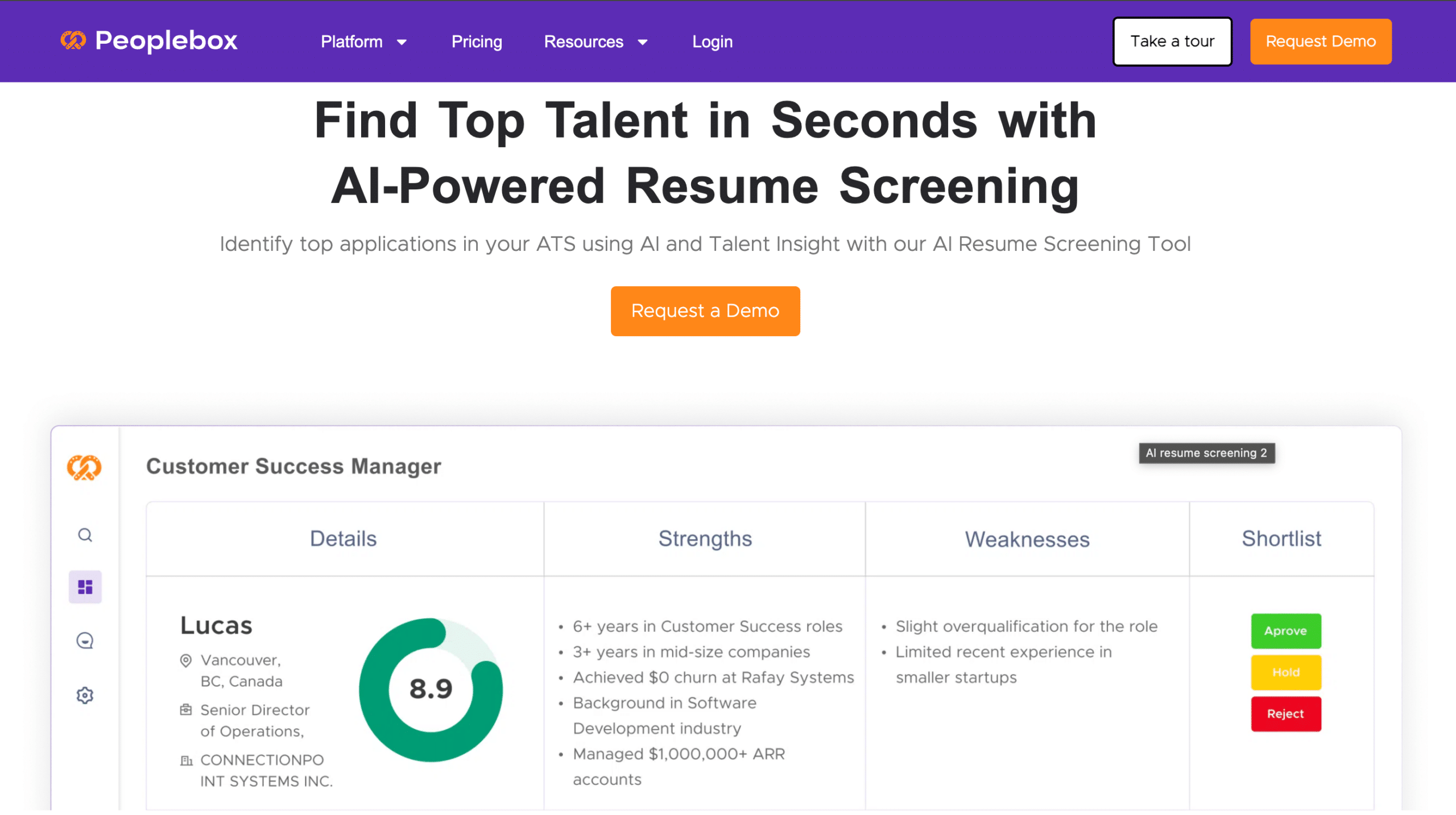
Peoplebox.ai is an AI-driven platform that helps HR teams screen resumes and shortlist candidates based on their skills, experience, and potential cultural fit. The AI models analyze resumes at scale, ensuring that hiring managers get a focused list of candidates who match the job description criteria.
Interact with this demo to see Peoplebox’s AI Resume Screening tool in action:
- Key Features: Cultural fit assessment, bulk resume parsing, and customizable job-matching algorithms.
- Price: Custom pricing based on team size and requirements.
Performance Review Platform
Get a glimpse of how Peoplebox make performance reviews painless, actionable and fair
The Ultimate Guide to AI in Recruitment
2. SeekOut – Talent Sourcing
SeekOut uses AI to mine public databases and professional networks, identifying candidates who may not be visible through traditional searches. Its algorithms analyze candidates’ qualifications and experience to refine searches for highly relevant talent. This provides HR teams with a more diverse and qualified pool of candidates in less time.
- Key Features: Advanced diversity filters, intuitive talent search dashboard, and real-time skill analysis.
- Price: Visit the pricing page.
3. HireVue – AI Video Interviewing
HireVue uses AI to assess video interviews by analyzing candidates’ facial expressions, voice tone, and word choice to assess how well they align with the job requirements. This helps HR teams evaluate candidates more effectively, with a focus on both skill set and behavioral fit.
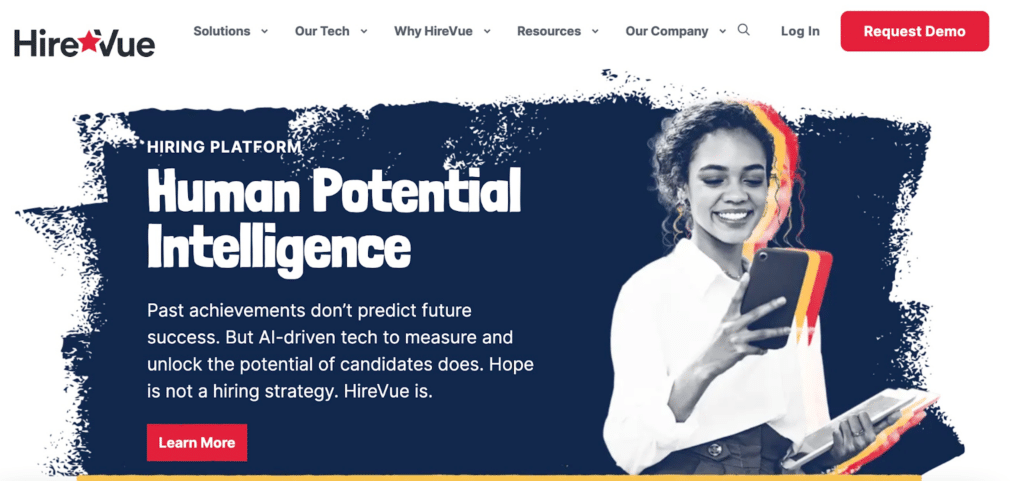
- Key Features: Asynchronous video interviews, AI-driven insights, and customizable evaluation metrics.
- Starting Price: $35K; Learn more.
4. Jobvite – Candidate Relationship Management
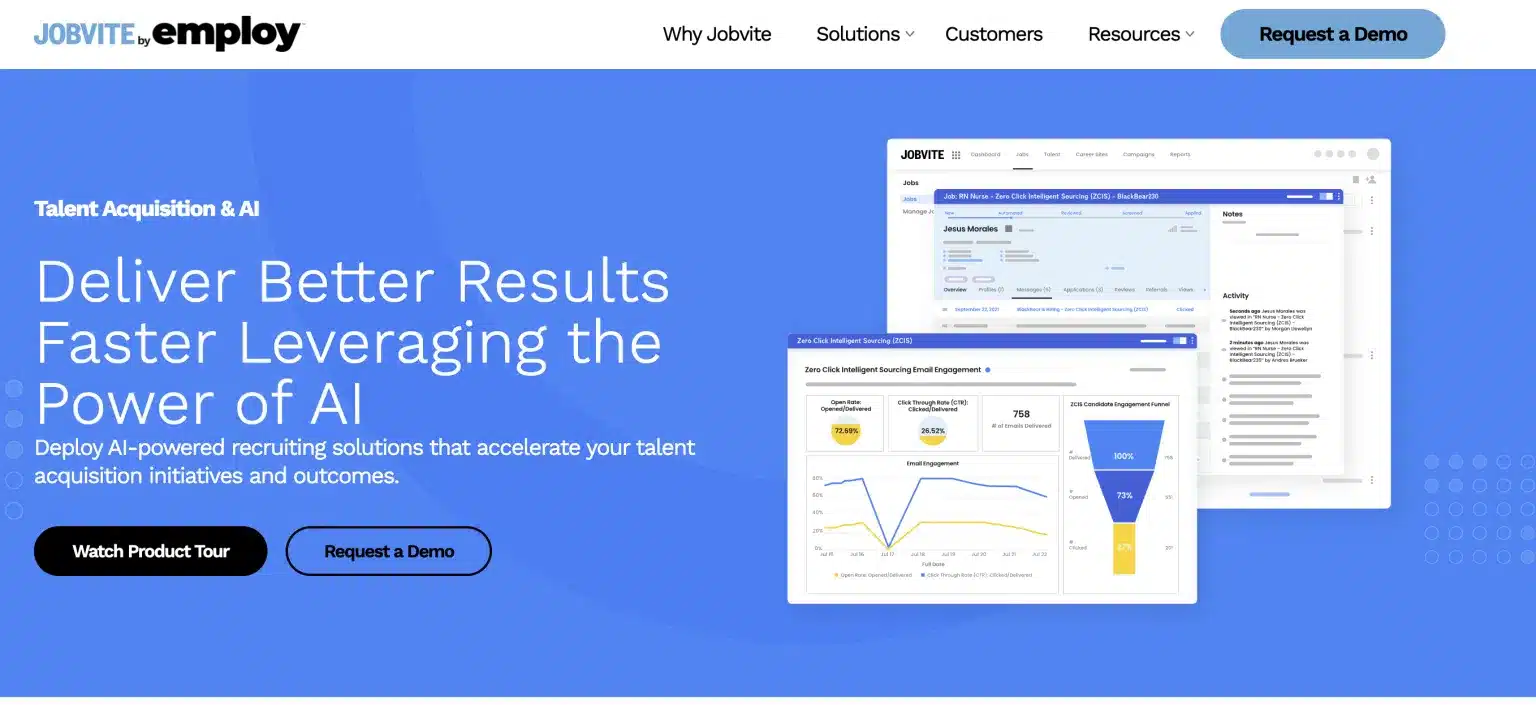
Jobvite’s AI-powered CRM tool helps maintain relationships with top candidates even after the hiring process.
It leverages AI to track candidates over time, providing HR leaders with insights into which candidates to engage with and when, ensuring no talent is forgotten or lost in the pipeline ensuring everyone is kept up to speed and informed on where they are in the hiring process.
- Key Features: Candidate tracking, automated re-engagement campaigns, and pipeline analytics.
- Price: Starting at $400.00/month; Custom pricing available upon request.
5. Phenom People – Candidate Experience Optimization
Phenom People uses AI to personalize the candidate experience, guiding candidates through the application process and recommending the best roles for them based on their qualifications and interests. This enhances the overall hiring experience and helps HR teams build a strong employer brand.
- Key Features: AI-powered chatbots, career path suggestions, and real-time candidate analytics.
- Price: Available on request.
AI Tools for Employee Engagement
6. Peoplebox.ai – AI-driven Feedback and Pulse Surveys

Peoplebox.ai automates the employee feedback process by creating surveys, sending reminders, and generating insights. It makes running engagement and pulse surveys easy, so you can focus on improving your company culture.
- Key Features: Automated and recurring surveys, Anonymous messaging, Real-time data and insights, Chat-based survey bot, Automated reminders, Slack/Teams integration, Ready-to-use survey template, Custom questions & drivers
- Price: The starting price is $7 per user per month; Custom pricing is available upon request.
7. Bonusly – AI for Recognition and Rewards

Bonusly’s AI tracks recognition patterns to identify frequently praised behaviors and high-performing employees.
By analyzing data trends, the AI provides actionable insights on team dynamics and helps HR optimize their recognition strategies. It also personalizes reward suggestions based on individual preferences and recognition trends.
- Key Features: AI-powered recognition tracking, personalized reward recommendations, and actionable team insights.
- Price: They have three pricing tabs – Appreciate: $2 per seat/mo, billed yearly; Connect: $5 per seat/mo, billed yearly, Achieve: $7 per seat/mo, billed yearly.
AI Tools for Performance Management
8. Lattice – AI-Assisted Performance Reviews
Lattice uses AI to enhance the performance review process by helping managers write clear, actionable feedback.
The AI-powered Writing Assist feature suggests improvements in language to ensure feedback is precise, inclusive, and impactful. This tool helps streamline the process by offering rephrasing options, making it easier for managers to deliver high-quality performance reviews.
- Key Features: Writing Assist for improving review clarity, Bias reduction and trend identification in feedback
- Price: $11/person/month* visit the pricing page for details.
9. Peoplebox.ai – AI-Powered Performance Feedback & Reporting
Peoplebox.ai uses AI to streamline the performance review process by automating feedback collection, consolidating data from multiple sources, and generating actionable insights. It simplifies the process, enabling managers to have more meaningful and data-driven performance conversations.
- Key Features: Easy, continuous performance tracking and insights, Customizable performance reports.
- Price: $7/month/person Visit the pricing page for details and offers.
Also Read: The HR Integration Handbook: Tools, Tips, And Techniques
10. 15Five – AI for Goal Setting and Alignment
15Five’s AI-driven platform aligns individual employee goals with company objectives, using machine learning algorithms to assess progress and suggest optimal goal adjustments.
The AI continuously analyzes employee performance data and offers insights on goal alignment, ensuring that employees remain focused on strategic priorities while tracking progress clearly and accurately.
- Key Features: AI-powered goal alignment, progress tracking, and predictive goal achievement insights.
- Price: Starts at $7.50/user/month. and goes up to $16/user/month (billed annually) for the entire platform.
11. Effy – AI for 360 Reviews
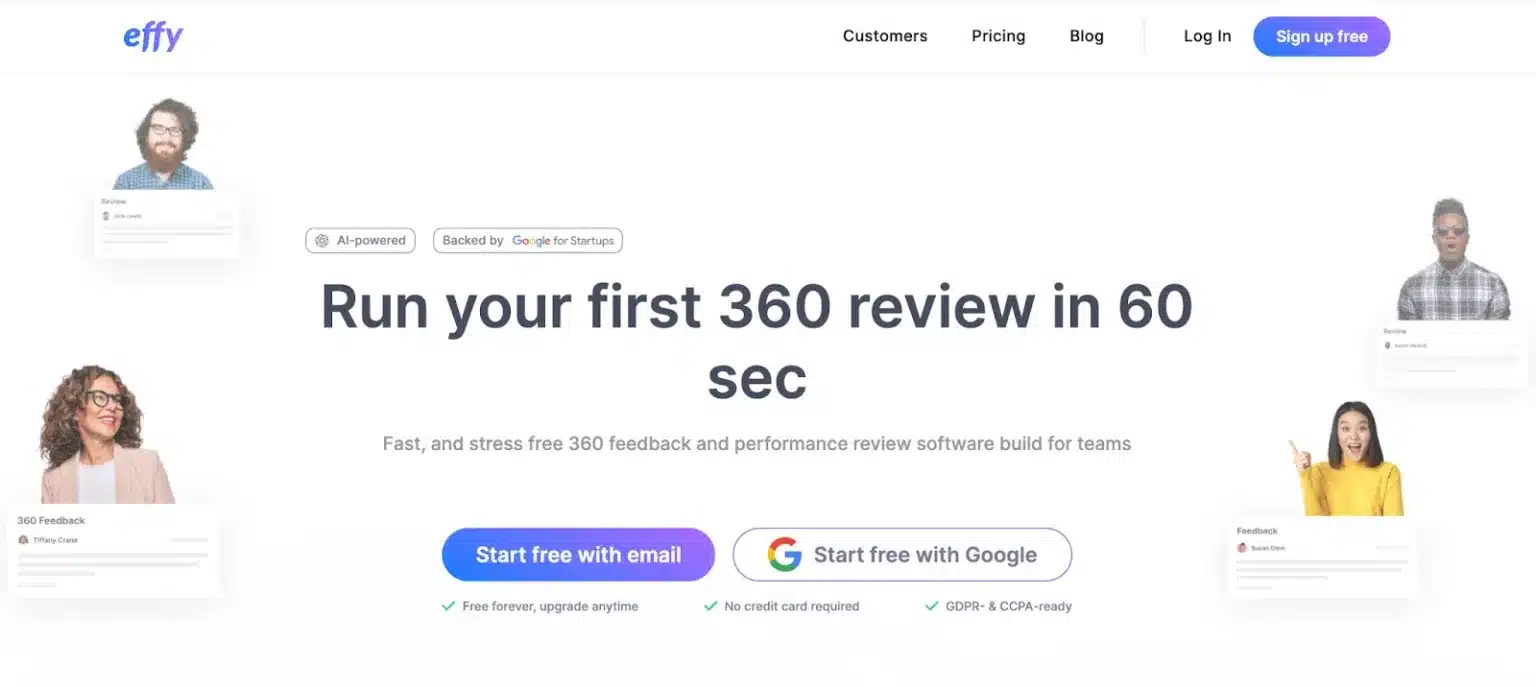
Effy AI makes running your first 360-degree review super quick—in just 60 seconds!
It handles everything from setting up the questionnaire and matching participants to monitoring progress and notifying everyone involved. Plus, it summarises all the responses and creates detailed AI-generated review reports for you.
- Key Features: Slack integration, Major project milestones, Formal performance review, Promotion or role change, New employee probation period
- Price: Free.
AI Tools for Employee Growth and Succession Planning
12. Cornerstone OnDemand – AI for Identifying Skill Gaps
Cornerstone OnDemand uses AI to assess employee competencies and identify skill gaps that may hinder career progression.
The AI analyzes performance data, feedback, and learning patterns to recommend personalized development plans, ensuring employees are equipped with the skills needed to grow into future roles. HR teams can easily track skill progression and ensure strategic talent development.
- Key Features: AI-powered skill gap analysis, personalized development recommendations, and employee growth tracking.
- Price: Starts at USD 6/user/month
13. Kona’s AI Leadership Coach
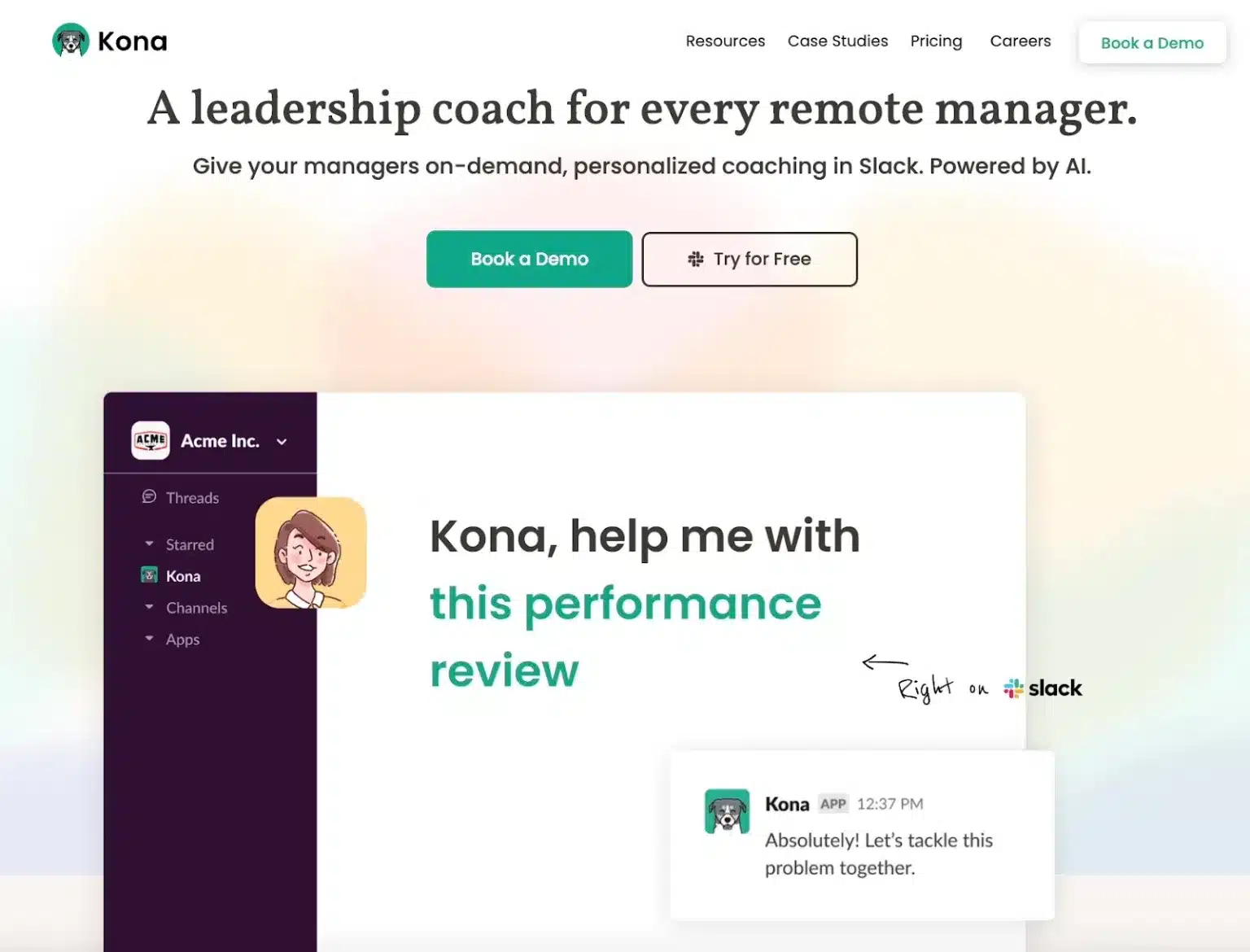
Kona’s AI Leadership Coach gives personalized coaching to remote managers right in Slack. It integrates with your existing documentation, training, and tools to give advice that fits your company values.
Managers can share real-life problems with Kona and get solutions in five minutes without leaving Slack or scheduling a call.
- Key Features: In-built integrations, Slack app, Leadership support
- Price: $49 per user, per month
14. Plum.io – AI for Leadership Development
Plum.io uses AI to predict leadership potential by analyzing an individual’s behavioral traits, cognitive abilities, and past performance data.
The AI identifies high-potential leaders, assessing their growth trajectory and readiness for more senior roles. By understanding leadership capabilities, HR teams can tailor development plans to accelerate leadership growth and ensure a strong leadership pipeline.
- Key Features: AI-driven leadership potential prediction, personalized leadership development plans, and growth trajectory mapping.
- Price: Custom pricing available upon request.
AI Tools for Employee Wellness and Mental Health
15. Woebot – AI for Mental Health Support
Woebot uses AI to provide mental health support via a conversational chatbot. The AI is trained to recognize emotional cues and offer tailored cognitive-behavioral therapy (CBT) techniques, helping employees cope with stress, anxiety, or other mental health challenges.
It offers confidential, on-demand support, making mental health resources more accessible and reducing stigma in the workplace.
- Key Features: AI-powered chatbot, cognitive-behavioral therapy (CBT) techniques, 24/7 confidential support.
- Price: Custom pricing available upon request.
16. LifeWorks – AI for Employee Wellness Monitoring
LifeWorks uses AI to continuously monitor employee well-being by analyzing various wellness data, including mental, physical, and emotional health indicators.
Its AI algorithms identify patterns and trends in individual and group wellness, providing HR teams with actionable insights to improve overall employee wellness strategies and support. The tool helps HR proactively address potential issues before they escalate.
- Key Features: AI-driven wellness data analysis, real-time insights on employee well-being, proactive wellness interventions.
- Price: Custom pricing available upon request.
17. Thrive Global – AI for Preventing Burnout
Thrive Global’s AI tools analyze employee behavior, including work patterns and emotional health data, to detect early signs of burnout.
The AI identifies risk factors such as prolonged stress and heavy workloads, alerting HR teams to intervene with personalized wellness initiatives before burnout occurs. This helps ensure employee productivity and mental health are maintained over the long term.
- Key Features: AI-driven burnout detection, real-time risk analysis, personalized intervention recommendations.
- Price: Custom pricing available upon request.
AI Tools for Diversity, Equity, and Inclusion (DEI)
18. Textio – AI for Bias-Free Hiring
Textio uses AI to analyze job descriptions and identify language that may unintentionally exclude candidates based on gender, ethnicity, or other factors.
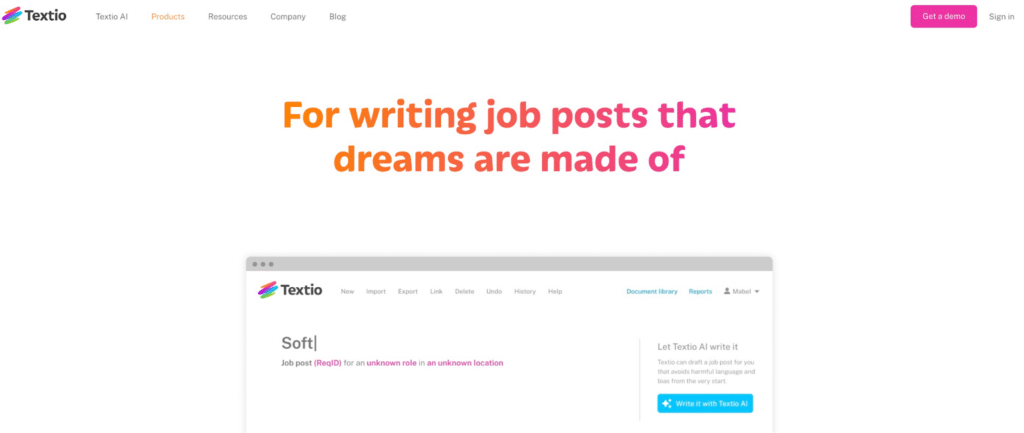
The AI suggests more inclusive language, ensuring job postings attract diverse talent. By using AI, HR teams can avoid common biases in job descriptions and create a more equitable hiring process that appeals to a broader pool of qualified candidates.
- Key Features: AI-powered language analysis, bias detection, inclusive job posting suggestions.
- Price: Custom pricing available upon request.
19. Diversio – AI for DEI Metrics and Tracking
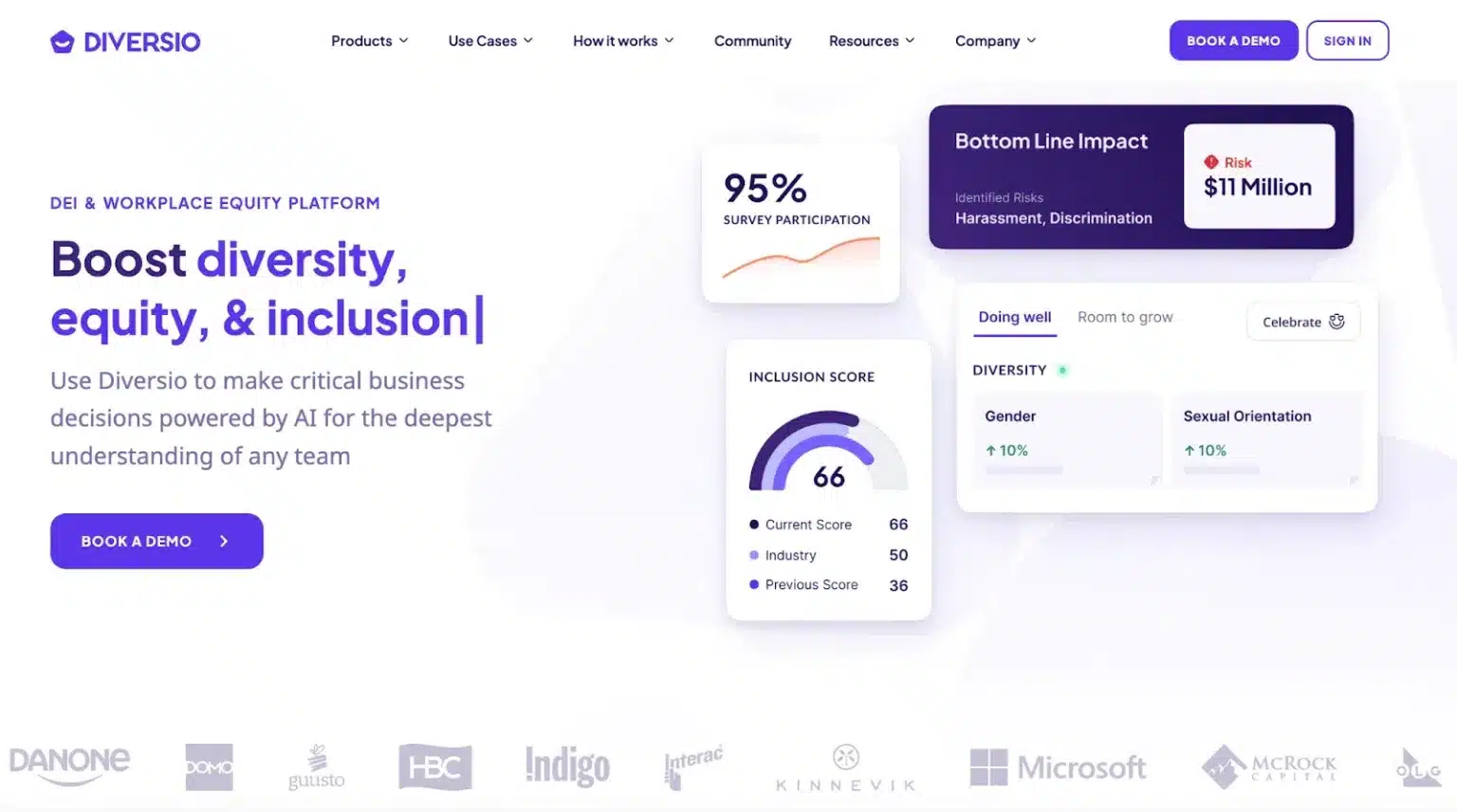
Diversio uses AI to track and measure DEI metrics in real-time, offering HR teams data-backed insights into their diversity and inclusion performance.
The AI analyzes employee demographics, engagement, and other key indicators to identify gaps and areas for improvement. This helps organizations stay on track with their DEI goals by providing actionable data to improve policies and practices.
- Key Features: AI-driven DEI data tracking, real-time performance analytics, actionable insights for DEI strategy.
- Price: Custom pricing available upon request.
20. CultureAmp – AI for Inclusive Culture Insights
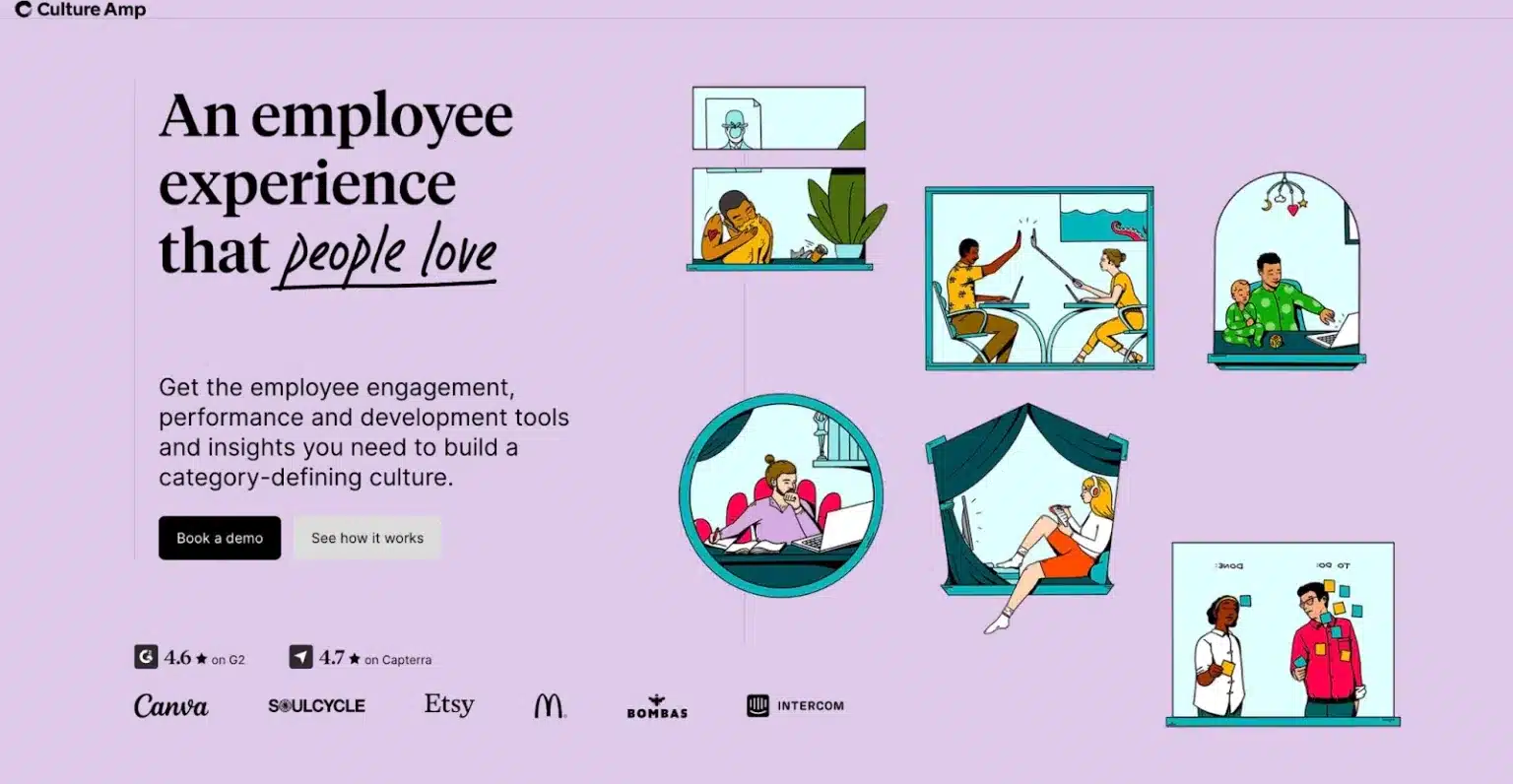
CultureAmp’s AI analytics provide insights into how inclusive a company’s culture is by analyzing employee feedback, behaviors, and engagement across diverse teams.
The AI identifies areas where DEI improvements are needed, helping HR teams implement targeted strategies to foster a more inclusive workplace. By tracking the experiences of diverse employees, the tool helps ensure a fair and supportive work environment.
- Key Features: AI-driven cultural analysis, inclusive workplace insights, employee experience tracking.
- Price: Custom pricing available upon request.
AI Tools for People Analytics
21. Visier – AI for Predictive Workforce Analytics
Visier uses AI to offer advanced predictive analytics, helping HR teams identify trends and forecast future workforce needs. By analyzing historical workforce data, AI models can predict talent shortages or surpluses, enabling HR to plan strategically.
This data-driven approach supports informed decision-making for workforce planning, ensuring that HR teams are prepared for future challenges like talent gaps or evolving business requirements.
- Key Features: AI-driven predictive analytics, workforce planning insights, trend identification, and talent forecasting.
- Price: Custom pricing available upon request.
22. PredictiveHR – AI for Employee Retention and Turnover Analysis
PredictiveHR uses AI to predict employee turnover by analyzing patterns in employee behavior, engagement, and performance data. The AI models identify high-risk employees and offer insights into the factors contributing to potential departures.
With this information, HR teams can proactively intervene with tailored retention strategies, minimizing turnover-related costs and improving overall employee satisfaction and retention.
- Key Features: AI-driven turnover risk prediction, retention strategy recommendations, employee behavior analysis.
- Price: Custom pricing available upon request.
AI Tools for Streamlining HR Operations
23. BambooHR – AI for HR Automation
BambooHR uses AI to automate a range of administrative HR tasks, significantly improving efficiency and reducing manual workloads. The AI streamlines employee record management, benefit tracking, and other repetitive tasks, allowing HR teams to focus more on strategic initiatives.
- Key Features: AI automation for employee records, payroll processing, benefits management, and HR workflows.
- Price: Custom pricing available upon request.
24. Talla – AI for HR Chatbots and Virtual Assistants
Talla offers an AI-powered HR assistant designed to handle employee queries and automate HR service delivery. By responding to frequently asked questions and managing routine HR tasks, Talla frees HR teams from answering repetitive inquiries, improving both the efficiency and accessibility of HR services for employees.
- Key Features: AI-powered chatbots for FAQs, employee self-service automation, HR task management.
- Price: Custom pricing available upon request.
25. Glean – AI for Enterprise Knowledge Management
Glean is an AI-powered work assistant that centralizes and personalizes company knowledge, ensuring employees and HR teams can quickly access the most relevant and up-to-date information.
By using natural language processing, Glean delivers tailored answers and insights, making information retrieval more efficient and reducing time spent searching for answers.
- Key Features: AI-driven enterprise knowledge management, personalized insights, real-time information retrieval.
- Price: Custom pricing available upon request.
26. Zapier – AI for Workflow Automation
Zapier leverages AI to automate workflows, saving HR teams time by reducing the need for manual data entry, file management, and cross-system communication. With AI-powered “Zaps,” HR professionals can streamline repetitive tasks, improving overall efficiency while reducing human error in daily processes.
- Key Features: AI-powered workflow automation, task integration across systems, customizable automation processes.
- Price: Starts at $19.99/month; pricing details available on the website
27. Grammarly – AI for Written Communication Improvement
Grammarly uses AI to enhance written communication, ensuring that HR teams produce clear, concise, and professional emails, job descriptions, and other HR documents. The AI analyzes tone, grammar, and clarity, helping HR professionals foster positive interactions with candidates and employees by improving the overall quality of communication.
- Key Features: AI-driven grammar and tone analysis, writing style suggestions, clarity enhancements for HR communications.
- Price: Starts at $12/month; business plans available on the website.
28. ChatGPT – AI for Conversational Assistance and Query Handling
ChatGPT helps HR teams automate repetitive tasks like drafting job descriptions, emails, and handling employee queries. The AI assists by generating clear, engaging content and responding to repetitive HR questions, making communication more efficient while allowing HR staff to focus on more strategic responsibilities.
- Key Features: AI-generated content for job descriptions, emails, and employee communication; conversational query handling.
- Price: Custom pricing available upon request.
29. Calendly – AI for Scheduling and Appointment Management
Calendly uses AI to streamline scheduling for interviews, meetings, and appointments by automatically suggesting optimal time slots. By integrating with existing calendars and systems, it reduces scheduling errors, improves efficiency, and ensures HR professionals and candidates can find mutually convenient meeting times with ease.
- Key Features: AI-powered scheduling automation, calendar integration, smart time slot suggestions.
- Price: Free basic plan, paid plans starting at $8/month.
30. Trello – AI for Task and Project Management
Trello uses AI to enhance project management for HR teams, helping them organize tasks, assign responsibilities, and automate workflow processes. With AI-powered automation, Trello streamlines collaboration, ensuring HR teams can focus on more impactful projects while improving productivity and efficiency across workflows.
- Key Features: AI-enhanced project management, task automation, workflow visualization, team collaboration.
- Price: Free basic plan, paid plans starting at $5/month.
31. Zoom AI Companion
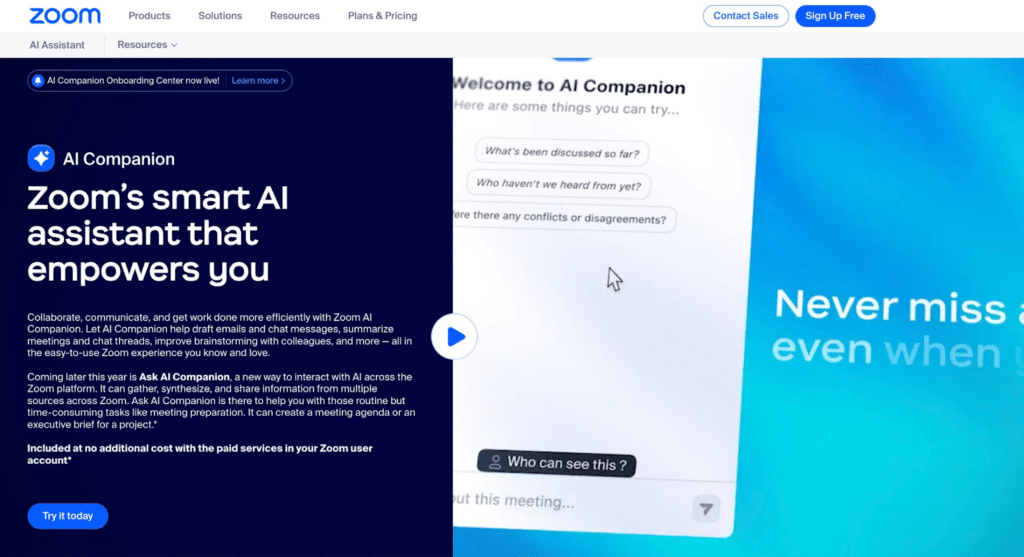
Zoom AI Companion, included with Zoom’s paid services, is an AI assistant that summarises chats, creates meeting recaps, and helps write chat responses based on your tone and length prompts. It saves time, allowing you to focus on more important tasks.
- Key Features: Meeting summary, Meeting questions, Smart recording, Thread summary, Chat compose, Sentence completion, Email compose (for Events)
- Price: Zoom’s starting price: $13.32/month/user, billed annually OR $15.99 billed monthly
AI Tools for Compensation and Benefits Management
32. PayScale – AI for Salary Benchmarking
PayScale uses AI to provide real-time salary benchmarking and analysis, enabling HR teams to maintain equitable and competitive pay structures.
The platform analyzes vast amounts of salary data across different industries, regions, and job roles, helping businesses adjust compensation to reflect market trends and ensure fair pay. This AI-driven solution supports organizations in staying competitive in employee compensation while attracting and retaining top talent.
- Key Features: Real-time salary data analysis, compensation benchmarking, market-driven recommendations.
- Price: Custom pricing available upon request.
33. Gusto – AI for Benefits Personalization
Gusto uses AI to optimize employee benefits, tailoring offerings to individual needs based on their preferences and life stages.
The AI analyzes employee data to suggest the most relevant benefits options, making it easier for HR teams to deliver a personalized experience. This increases employee satisfaction and engagement by ensuring that benefits are both relevant and comprehensive.
- Key Features: Personalized benefits recommendations, employee data analysis, benefits optimization.
- Price: Starts at $40/month per employee, with customizable pricing available for larger teams.
AI Tools for Onboarding and Offboarding Automation
34. Enboarder – AI-driven Remote Onboarding Platform
Enboarder is a cool AI tool that makes bringing new employees into the team both easy and fun. It sets up fun activities to help new people feel welcome right away. It also helps managers make a great first impression.
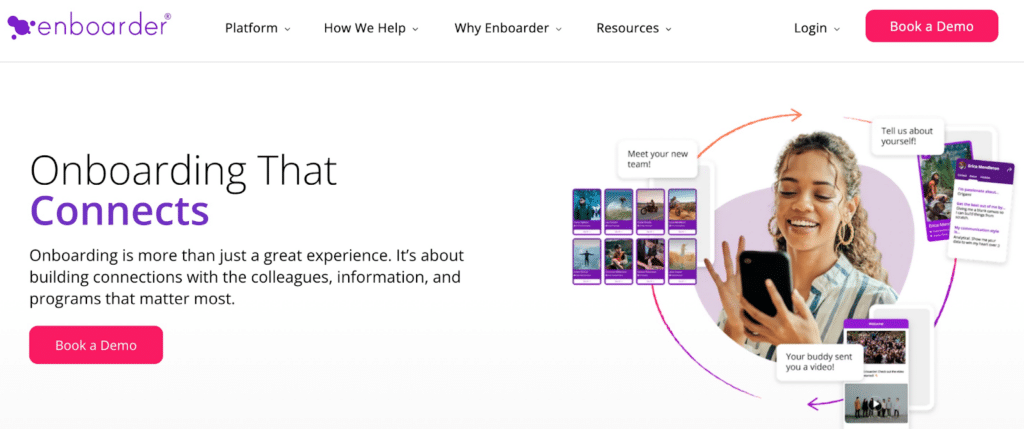
Their approach has resulted in a 20% yearly decrease in early employee turnover and a 50% reduction in candidates who accept a job offer but do not start. Additionally, it led to 65%+ increase in new-hire productivity.
- Key Features: Admin dashboard, Workflow builder, Reports, Communication, Schedule events, Video on the go, People connector, Multiple language support
- Price: Custom pricing available upon request.
35. Offboard – AI to Manage Employee Exit and Retention Data
Offboard uses AI to manage employee exits and track retention data, helping HR teams identify patterns and insights related to employee turnover.
AI analyzes exit interviews, survey responses, and other exit-related data to uncover reasons behind departures and suggests strategies to improve retention. This ensures smooth transitions for employees leaving the organization and enables HR professionals to address potential retention issues proactively.
- Key Features: Exit interview analysis, retention insights, employee offboarding automation.
- Price: Custom pricing available upon request.
AI Tools for Compliance and Risk Management
36. XpertHR – AI for HR Compliance Monitoring
XpertHR uses AI to automate HR compliance checks, helping businesses stay aligned with labor laws and regulations. The platform monitors legislative changes and ensures that HR practices are in compliance with federal, state, and local laws. This reduces legal risks and helps HR teams remain proactive in addressing potential compliance issues, safeguarding the organization against costly penalties.
- Key Features: Compliance tracking, real-time alerts for legal updates, automated compliance audits.
- Price: Custom pricing available upon request.
37. Compliance.ai – AI for Tracking Regulatory Changes and Risks
Compliance.ai uses AI to track regulatory changes and identify potential risks related to HR practices. By analyzing thousands of legal sources, it provides HR professionals with real-time updates on regulatory changes that could impact the business.
The platform’s AI-driven insights help mitigate risks and ensure that HR practices remain compliant with changing regulations, preventing legal exposure.
- Key Features: AI-driven risk detection, real-time regulatory updates, compliance monitoring.
- Price: Custom pricing available upon request.
AI Tools for Remote Work and Hybrid Work Enablement
38. Slack – AI for Seamless Communication and Collaboration
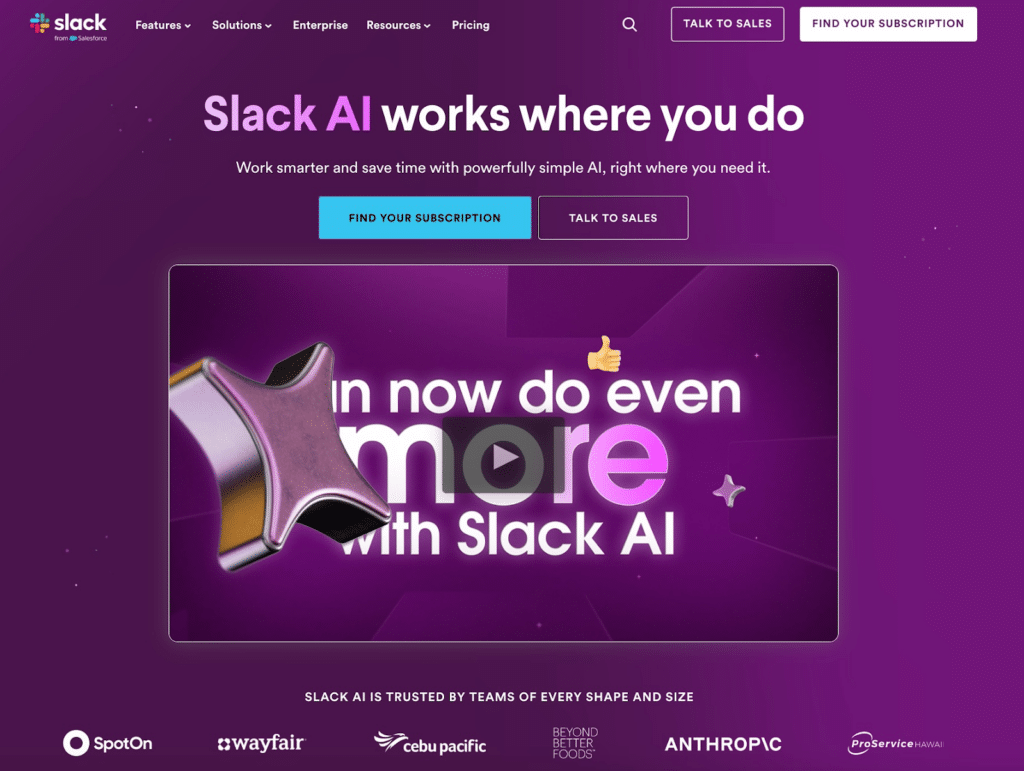
Slack, widely used for remote team communications, employs AI to deliver personalised search results, channel recaps, and thread summaries. This helps quickly surface relevant information and reduces the time spent sifting through countless messages and channels.
- Key Features: Personalised search, Summarise conversations, Daily recap of messages missed
- Price: Slack Pro: $7.25 USD per person/month, billed yearly $8.75 USD per person/month when billed monthly; Slack Business+ $12.50 USD per person/month, billed yearly $15 USD per person/month when billed monthly.
39. Donut – AI for Fostering Employee Connections
Donut uses AI to facilitate connection-building in remote and hybrid work environments. The tool pairs employees randomly for virtual coffee chats or team-building activities based on shared interests or job roles.
By encouraging informal conversations and social bonding, Donut strengthens remote team relationships and helps employees feel more connected to each other and the organization, improving employee engagement and morale.
- Key Features: Automated employee pairing, virtual coffee chat scheduling, team-building activities, and engagement analytics.
- Price: Starting at $5 per user/month.
40. Monday.com – AI for Customizable Workflow Automation
Monday.com uses AI to automate routine tasks, streamline communication, and provide insights into project progress. The platform’s AI features allow HR teams to automate onboarding processes, employee check-ins, and reporting, enabling teams to work efficiently without micromanagement while ensuring tasks and projects stay on track.
- Key Features: Workflow automation, project tracking, reporting insights, task prioritization.
- Price: Starting at $8 per user/month.
Performance Review Platform
Get a glimpse of how Peoplebox make performance reviews painless, actionable and fair
The Ultimate Guide to AI in Recruitment
Benefits of Using AI in HR
AI tools are revolutionizing HR by making processes smarter, faster, and more precise, enabling HR professionals to focus on what truly matters—people. Here’s what you can expect:
1. Increased Efficiency
AI powered tools automate many time-consuming tasks like data entry, scheduling, and initial candidate screening.
This frees up HR professionals to focus on more strategic and personalised aspects of their roles.
A CareerBuilder survey showed that employers who used automation in their hiring and management processes are really happy with the results: An impressive 93% of them have noticed they saved a lot of time and worked more efficiently.
2. Data-Driven Decision-Making
With the help of AI-driven data analytics, HR teams can make data-driven decisions.
AI powered platforms provide deep insights through data patterns that might not be evident through manual analysis.
Bernard Marr, Author of ‘Data-Driven HR: How to Use AI, Analytics and Data to Drive Performance’, writes in Forbes, “HR professionals are now using data and AI to equip decision-makers with critical information, create valuable people-centric reports, and enlighten leaders about what’s happening on the ground from moment to moment.”
He explains how Juniper Networks uses LinkedIn data to track where top employees come from and where they go when they leave. This helps the company understand career paths and make smarter choices to attract and retain talent.
Suggested Read: How AI in HR is Transforming Your Workforce
3. Enhanced Accuracy
AI-powered tools reduces human error in processes like payroll, benefits administration, and compliance reporting.
Human errors in data entry alone happen about 4% of the time, meaning 400 mistakes per 10,000 entries, especially when data is only entered once without double-checking. This figure doesn’t even include errors made during data analysis, reporting, or storage.
Bad data can be very costly, with the U.S. losing around $3.1 trillion yearly due to it.
Automating these tasks helps reduce mistakes caused by human oversight or fatigue.
4. Personalised Employee Experiences
AI can analyse individual employee data to provide personalised recommendations for career development, learning paths, and even wellness programmes.
Recruitment engagement rates double when personalised messages are written using AI. This personalisation helps in creating a more engaged and satisfied workforce.
5. Predictive Capabilities
AI tools can forecast future trends such as employee turnover, recruitment needs, and the effectiveness of HR policies. For example, IBM AI can reportedly predict which workers are about to quit their jobs with 95% accuracy.
This allows companies to plan more effectively and proactively address potential issues before they become problematic.
6. Cost Reduction
By automating routine tasks and improving the efficiency of various HR functions, AI tools can help reduce overhead costs.
For example, a medical company was able to save $4,000 every month by using automated HR tools, according to a case study by Gravity Flow.
Things to Keep in Mind When Using AI Tools in HR
Clearly, AI can optimize our work processes across the spectrum. However, we must use it responsibly as it is still an evolving technology.
Here are some key things to consider:
1. Watch Out for Biases
AI systems can perpetuate existing biases if they’re trained on biased data. This can lead to unfair decisions in critical areas such as layoffs, promotions, and hiring.
To prevent this, it’s essential to regularly audit your AI tools for any biases or unfairness. Make sure that these tools are used ethically to support fair and just outcomes.
2. Keep the Human Touch
AI can now handle everything from recruiting and onboarding to employee training and performance evaluations. While it’s tempting to automate as much as possible, don’t forget the importance of human contact.
Without real people, the workplace might start feeling cold and impersonal. Keep a balance between using AI to increase efficiency and maintaining personal interactions to create a welcoming and supportive environment.
3. Transparency in AI Decisions
It’s important to understand how AI tools make decisions. These systems often use complex algorithms based on large data sets to make predictions or choices.
Let candidates and employees understand the criteria and processes AI uses to make decisions that affect them. By doing so, you increase transparency and trust within your organisation.
4. Data Privacy and Security
Choose tools that have built-in privacy features to safeguard sensitive information. It’s crucial to ensure that the AI tools you use comply with data protection regulations such as GDPR.
Work closely with your organization’s compliance and security teams to keep data safe. By prioritising data privacy and security, you protect not only your company but also the personal information of your employees and candidates.
What AI Tools Can’t Replace for HR Professionals
AI handles the data. You handle humanity. No algorithm can replace:
- A compassionate conversation
- Understanding someone’s unspoken career dreams
- Building trust during a difficult performance review
What AI tools can do is give you time to actually do those human things. By taking care of the repetitive stuff, it lets you focus on what really matters.
|
Feature Spotlight Peoplebox.ai – GenAI for All Your Talent Acquisition and Management Needs Why Peoplebox.ai Stands Out: Peoplebox.ai is the only unified platform that integrates Talent Acquisition (TA) and Talent Management (TM) seamlessly. Forget juggling multiple tools. With Peoplebox.ai, you leverage real-time data from performance management, OKRs, and even candidate screening—all within one solution. How Peoplebox.ai Solves HR Challenges 1. Unified Talent Strategy: Use one tool to connect hiring decisions, performance reviews, and employee growth plans. 2. Comprehensive Insights: From creating unbiased job descriptions to enriching resumes and managing OKRs, every talent touchpoint is streamlined. 3. Data-Driven Decisions: Align hiring, performance, and development decisions using granular, real-time insights. Request a Demo → |
Performance Review Platform
Get a glimpse of how Peoplebox make performance reviews painless, actionable and fair







